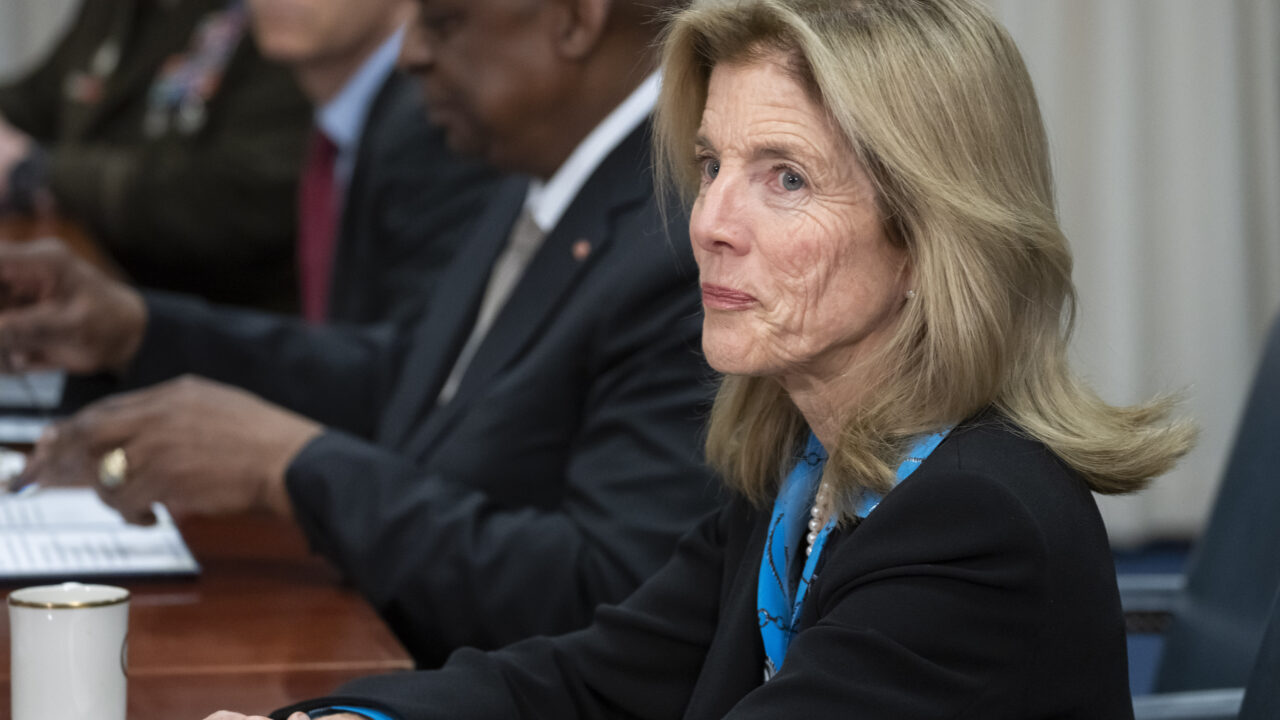Can Julian Assange Get a Plea Deal to Earn His Freedom?
A plea deal might be possible, Caroline Kennedy, the U.S. ambassador to Australia, hinted recently. Caroline Kennedy, U.S. Ambassador to Australia, is seated during a meeting between Secretary of Defense Lloyd Austin and Australian Deputy Prime Minister and Minister of Defense Richard Marles at the Pentagon, Monday, Dec. 5, 2022, in Washington. (AP Photo/Alex Brandon)
This is Part of the "The Persecution of Julian Assange" Dig series
Caroline Kennedy, U.S. Ambassador to Australia, is seated during a meeting between Secretary of Defense Lloyd Austin and Australian Deputy Prime Minister and Minister of Defense Richard Marles at the Pentagon, Monday, Dec. 5, 2022, in Washington. (AP Photo/Alex Brandon)
This is Part of the "The Persecution of Julian Assange" Dig series
The U.S. ambassador to Australia, Caroline Kennedy, suggested to The Sydney Morning Herald Monday that a plea deal might be possible to resolve the plight of Julian Assange, the whistleblower fighting extradition to the U.S.
The plea deal floated by Kennedy would arrange for Assange to return to Australia. “It’s not really a diplomatic issue, but I think that there absolutely could be a resolution,” she told the Morning Herald. “There is a way to resolve it,” she added.
Assange faces 18 criminal charges in the U.S., including 17 under the U.S. Espionage Act.
In 2010, Assange shared confidential government files, including footage of a U.S. airstrike that killed 18 civilians in Baghdad, Iraq. He also exposed U.S. military reports chronicling the dire crisis of the U.S. war in Iraq. U.S. Secretary of State Antony Blinken said last month that Assange had committed a “very serious crime.”
Assange has been imprisoned in the maximum-security Belmarsh Prison in Britain since 2019, since being taken away from Ecuador’s London embassy that year, after living there since 2012.
The plea deal floated by Kennedy would arrange for Assange to return to Australia.
The Intercept reports that Gabriel Shipton, Assange’s brother, told the publication that the administration is searching for an off-ramp ahead of the Australian prime minister’s state visit to D.C. in October.
Assange’s supporters noted that thus far, the U.S. government’s handling of the case presents a threat to whistleblowers. “We believe that this sets a very dangerous precedent and has the potential to put at risk anyone, anywhere in the world, who publishes information that the U.S. unilaterally deems to be classified for security reasons,” wrote a group of former Australian attorneys general wrote to Prime Minister Anthony Albanese last week.
Labor MP Julian Hill, a member of the Bring Julian Assange Home Parliamentary Group, said, “I would say back to the United States: at the very least, take Julian Assange’s health issues seriously and go into court in the United Kingdom and get him the hell out of a maximum security prison where he’s at risk of dying without medical care if he has another stroke.”
So far, the U.S. government has refused to budge in the face of international pressure.
Your support matters…Independent journalism is under threat and overshadowed by heavily funded mainstream media.
You can help level the playing field. Become a member.
Your tax-deductible contribution keeps us digging beneath the headlines to give you thought-provoking, investigative reporting and analysis that unearths what's really happening- without compromise.
Give today to support our courageous, independent journalists.




You need to be a supporter to comment.
There are currently no responses to this article.
Be the first to respond.